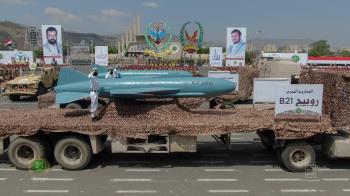Alwaght- On Wednesday evening, in the south of the Lebanese capital Beirut a news report came as a bombshell. It was about a big bombing and assassination operation; targeting senior Hezbollah commander Fuad Shukr. But that assassination was not the only incident of that night. Hours later, in the midnight, a suspicious assassination in Tehran targeted the head of Hamas Political Bureau Ismail Haniyeh.
The top culprit of the two terrorist assassinations was no party but Israel. The Israelis officially claimed the responsibility for the the bombing of southern Beirut, and in the terrorist assassination of Haniyeh, all the evidence and even the admissions of some Israeli officials indicated that Israel was behind the attack.
One day after the assassinations in Beirut and Tehran, the official account of the Israeli army together with Israeli Defense Minister Yoav Gallant confirmed launching of a terrorist attack two weeks ago in Khan Yunis, Gaza, and claimed that in the past few weeks Mohammad Dhaif, the commander of the military wing of Hamas, has also been assassinated in southern Gaza. Having in mind that Dhaif assassination attempt took place a few weeks ago, a question raises itself: Why has Israel claimed responsibility for Gaza assassination attempt simultaneous with the terror operations in Beirut and Tehran?
Assassination chain after Netanyahu's US visit
A cursory look at the assassinations carried out by the Israeli regime in the past few days shows that they were carried out after Benjamin Netanyahu returned from his trip to the US, as if the Israeli PM had received a green light from Washington to start a new chapter of terror operations. Even after returning from Washington, Netanyahu not only carried out two costly assassinations in Beirut and Tehran, but also at the same time confirmed that he had carried out another important assassination, the assassination of Dhaif in southern Gaza, a few weeks earlier. So why did Netanyahu not officially announce the assassination of Dhaif two weeks ago and before his trip to the US? Why did Netanyahu confirm the assassination of the military commander of Hamas in Gaza at the same time as the assassinations in Tehran and Beirut? In fact, the assassination of Dhaif in southern Gaza is two weeks before the assassination of Haniyeh in Tehran and Shukr in Beirut, but Netanyahu announced the assassination of Hamas military commander at the same time as the assassination of Haniyeh and Shukr. It is as if there is a special meaning hidden in this simultaneous announcement, and it seems that Netanyahu was worried about announcing the assassination of the military commander of Hamas before his trip to the US, but after returning from Washington, he carried out the two attacks and confirmed Gaza operation.
US's simultaneous operation
Another issue is that Netanyahu's terrorist operations in Beirut and Tehran did not happen alone. Rather, the US simultaneously launched strikes in Iraq targeting resistance commanders. In a related report, Reuters said that in the last two days, at the same time as the operations in Beirut and Tehran against the commanders of the Hezbollah and Hamas, a senior commander of Kataib Hezbollah of Iraq, named Ahmed Najm Abdul Zahra, nicknamed Abu Hassan al-Maliki, was assassinated by airstrikes of US forces on a Popular Mobilization Forces (PMF) base in Babil province of Iraq. Three other members of Iraq's Kataib Hezbollah, Hussein Karim Kadhem al-Daraji, Haider Hassan Hussein al-Saadi, and Ali Sadegh Imran al-Mousavi" were also killed in the American airstrikes. The important point is the coincidence of the American air operations against the resistance commanders in Iraq with the Israeli terrorist operations in Beirut and Tehran. This coincidence is definitely not accidental and indicates a behind-the-scenes coordination between Tel Aviv and Washington.
Assassinations aiming to save Netanyahu
At present, the Israeli PM has made a big gamble by assassination attacks in Tehran and Beirut. He had crossed the most sensitive red line and initiated a dangerous gamble. Netanyahu's thought behind this gamble is that he might be able to expand the war from the Gaza front to new fronts outside Palestine. The expansion of the war front from Gaza to beyond the borders of Palestine, including in Lebanon, and even in Iran, will ease the pressure of global public opinion on the developments in Gaza to some extent, and perhaps, as Netanyahu thinks, the observers' eyes will turn from Gaza to West Asia and Lebanon. Anyway, there are other reasons for Netanyahu's attempt to push the war borders beyond Gaza.
Easing global pressures on Tel Aviv for Gaza war end: Expanding war beyond Gaza front will relax the pressure of global public opinion calling for ceasefire in Gaza. This is Netanyahu's imagination of his gamble these days. Now many are demanding a de-escalation regarding Tehran's response to Israel. It seems that the global calls now focus on Iran and Hezbollah show of self-restraint and are shifting from Gaza ceasefire.
Pushing to continue the war: For Netanyahu, continuation of war is as pivotal as blood to a living man. Halt of war means end of Netanyahu, because stopping the war means resignation of the hardline cabinet ministers and this means collapse of the Netanyahu-led coalition government. By pressing ahead with war, Netanyahu tries to appease these ministers for him to rule Israel longer. The collapse of Netanyahu's cabinet and the end of his premiership means the beginning of a judicial process and possibly the execution of a prison sentence for him, so Netanyahu is not willing to stop the war under any circumstances, to avoid the Haridi-majority cabinet collapse. The next step after the collapse of Netanyahu's cabinet can be the execution of a prison sentence for him on charges of corruption and graft while holding the office. Undoubtedly, between going to prison and continuing the war, Netanyahu has picked the second option.



























